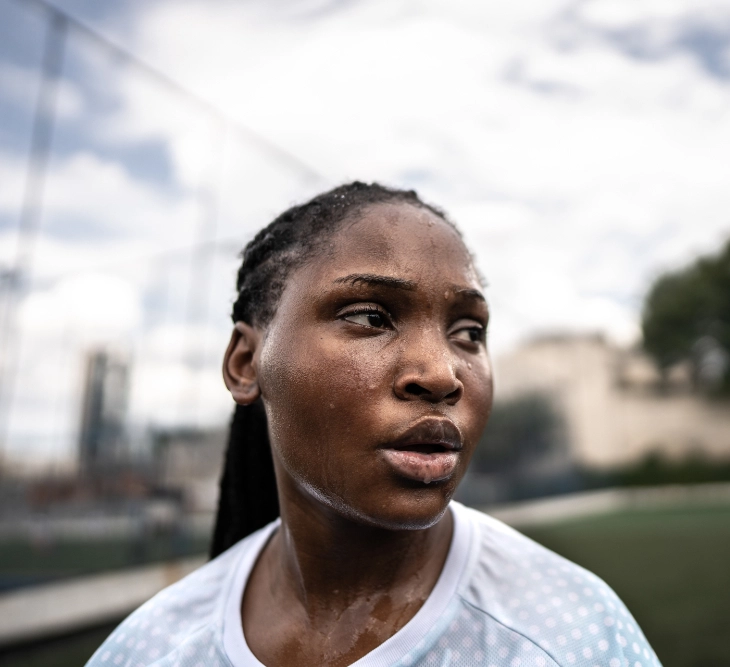
Athletics
Why Athletes Should Always Have a Plan B
No matter how well you plan, how hard you train or how much attention you pay to the smallest details, things will go wrong, whether that’s cancellations due to bad weather, injuries or last-minute event changes. That’s where contingency planning – creating your plan B – comes in.
Joe Beer reveals how to evolve your level of adaptation, keep moving forward and be future-proofed to respond to adversity.
1 min read
Picture any sports performance in the past year, at some stage an athlete (or organisers) have had to quickly change tactics to overcome some hiccup, a small change of circumstance or a complete calamity approaching, and fast.
The cyclist who needs a bike change, and a quick one at that, or it's a no-medal day.
The pole vaulter with only one attempt left at a height they should be doing with their eyes closed.
The contingency planning and re-organisation needed when heavy rain whips up river pollution.
You were watching Plan B of Evenepoel, Duplantis and the Paris Olympic Organising Committee.
You (and me) have been on plan B more than we might realise or want to accept. Many people feel their lives are under full control by denying it, ignoring the reality that change is actually ever-constant.
From planning your training sessions, your diet, and the segments of your life when you get to relax, really relax well, life does not always play along. To believe that you have all things under your control is an illusion. Why? Because you can only have so much control, and all that actually matters is that you control factors to help you be more on-plan than off it.
Time management expert David Allen[1] says to try setting a reminder for a month from now that says ‘something unplanned will land in your life, big or small, and change things’. And prove him wrong. I guess we all love to think things are settled and nicely constant when in reality, it’s all change, all the time. For everyone.
Diet wrecked by new work and travel demands. Gym routine turned upside down by re-fit of new equipment and opening hours. The fast half-marathon route changed to include a hill that's going to make it soooooo-slow! The list goes on. However, surely there are frameworks to help us deal with constant change and random life adversity?
The Five P’s
This is probably different to the one you may have heard before. A bit more classy and it adds an element of “outside your control”. This new mantra should read:
Planning Prevents Poor Performance, Possibly!
So, you start with a plan that works towards whatever goal you want to achieve. However, we acknowledge that this is still only a “possible goal”. Something, someone or our very own actions could scupper such best-laid plans. Has every goal set in the history of humankind always been achieved? No.
So, the foresight to add “possibly” to your planning gives robustness, as now it means you should look for potential threats to it not coming true - something the original 5P’s saying failed to consider, it was just assumed a good plan equals good performance.
I love the quote told to me by an ex-military man who I coached for several years towards multiple Half Ironman events, it summed up the actual fragility and thus need for constant adaptation:
No plan survives contact with the enemy.
So, make plans, but always be ready for them needing to change in the harsh reality of being let out into the wild (from the controlled area of your brain out into the chaos of the real world).
You must always have a plan B. Like having some spare weights at home allows a simple session when the gym is just not happening. Those spare run shoes in the boot of the car mean you don’t miss a run when you forget your shoes or you even get an extra run when some spare time and a great venue cry out.
That piece of equipment in the garage you don’t love but will be useful if childcare or a pending delivery means no outdoor planned cardio will happen right now. Well they, and many more, are genius plan B’s.
In the real world
You need to evolve your level of adaptation. Become a refiner of your plan B - and probably therefore also have a plan C up your sleeve. An example of how athletes have adapted can help show that evolving to what is going on all around you is the only choice:
Ironman athlete crashes during the bike section of the 140-mile event, with still miles to ride and a marathon to run. They have lost time and know they cannot now hammer it to make up the time getting patched up and riding again.
The athlete, in a post-mortem after the race said they just shift into a mode that we had spoken about many many times: “What is the best thing I can do right now?”.
The immediate reply in the athlete's brain was “Get up, check the bike, check myself (NB> Yes most really do it in that order, bike first), get patched up and just get going ”.
Ten minutes later they asked themselves “Can I keep going for another 20 minutes?”, and this is repeated, despite many chances to stop, until they finally get to the finish line (probably 30-40 minutes later than they expected) achieving what they set out to do: finish the ironman, the “time” was always secondary and you never know what extra adversity may be thrown to you on that day.
Many examples may be quite small by comparison to the one above, the need to bump a weights session an hour or a day later, an enforced day off required due to horrendous sleep the night before or, an event cancelled as other life events get in the way.
The Plan B mindset is about having logical alternatives should things not go exactly to plan. This starts with:
-
TRAIN THE BRAIN
Training yourself to have a mindset to think ahead, after all plans made up in the heat of the moment are rarely going to work.
-
RESOURCE READY
Making suitable resources available should this new plan be needed (e.g. had the rider about got a puncture did he have a spare tube etc? And yes as a matter of fact, they did).
-
PRACTICE
Not all plans should be practised, after all, I don’t ask athletes to throw themselves off their bikes to see what might happen. However, if it can be practised then do it, if not then visualise it as part of regular sessions where you play out the “What if’s?” that could be coming your way. This is not being fatalist, it is being logically ready for things that may happen. Visualisation exercises like this form a large part of the foundational sports psychology work that some of the world’s top performers complete in the run-up to major events.
"Adapt, don’t whinge"
See TestsI love the Michael Johnson quote[2]:
You can accomplish most things you set out to do, but it will take time. Don’t shoot for something unattainable - completely outside of your nature or opportunity. At least not right away.
So learn to adapt, learn the efficient way to get the next step done but keep on evolving your plan. Don’t just give up because the second run of your couch-to-5k got cancelled or you got a heavy cold and that stopped you from meeting friends at your weekly gym class.
My coaching observations over 30 years have always come back to the same conclusion:
People are either adapters or victims.
They either get on with the hand they're dealt or they complain the deck is rigged and everyone else is not dealing with the hardship they have.
The person who is the “victim” will always blame others, take the “woe is me” route and look for sympathy, not solutions. Happier and more productive athletes get on with the hand they have been dealt - they know it's 90% about the attitude you take into your next situation and 10% the work that follows your attitude.
Taking some of David Allens ideas[1] ideas across to health and fitness I think if you are organised and keep yourself doing small actions, then you will move towards the things you want. It won’t always be forward momentum but you don’t just stop, give up and bemoan the world. A guarantee there are things coming your way that will change your world. You just need to be adaptable to them when they arrive.
If it seems you have control, things are good and you are happy, then be thankful. Meanwhile, continue to build your resolve and be calmly ready for the you-know-what to hit the fan. If things are out of control and every goal seems to vanish, get organised, give yourself a plan to do just some small steps and learn how you can be the maker of your own destiny. It’s just not going to be easy or overnight. Happy learning and growing.
Take away tips
-
ORGANISE
Want to achieve big goals? Or new habits you want to foster? Well, guess what, they are always easier to achieve if you are organised. It gives you more focus to get on with what you know you need to do and not spend time worrying about what you should be, could be or haven’t done.
-
STATE IT
Writing down your goals or desired outcomes means your brain is already clear on what the end result is. We want goals to drive actions to make permanent and rewarding achievements. You want to be the cause-and-effect. You want to “learn” how to be the adaptable “you”. You could consider using the SMARTER method. Athletes benefit from SMARTER goal setting as it creates a clear, structured path to success. By setting goals that are Specific, Measurable, Achievable, Relevant, Time-bound, Evaluated, and Revised, you can maintain focus, track progress, and adapt your plans, ultimately enhancing performance and maximizing potential.
-
BE CREATIVE
You need to be creative about how to make each step forward. If you do what you’ve always done you will get what you’ve always got. So, think outside of your habits, time management and ideas to new thoughts that offer some great new actions. New goals can only be achieved by new actions.
-
REVIEW
A goal requires lots of steps, sometimes with delays between each step - so use these pauses to check up on yourself. You cannot set a goal and it just happen, you need to constantly be tweaking the new thoughts in your head, the actions you do and (most importantly I think) adapting the plan to how it helps or hinders your movement towards a goal.
Blood test for
Male Triathlete
18 Biomarkers Included
sports doctor review
Results in 2 working days
Flexible subscription
-
Allen, D. (2004) Ready for Anything: 52 productivity principles for work and life. Penguin Putnam Inc. ISBN 0749941022
-
Johnson, Michael. (1996) Slaying the dragon. Piatkus. ISBN 0749917237
Read Next...
Get expert advice to help you improve your results.
Go to our knowledge center
A Guide to Push, Pull, Legs
Athletics
Get 10% off your first order
Want regular tips on how to make the most of your results? Join our newsletter and we'll give you 10% off your order!


